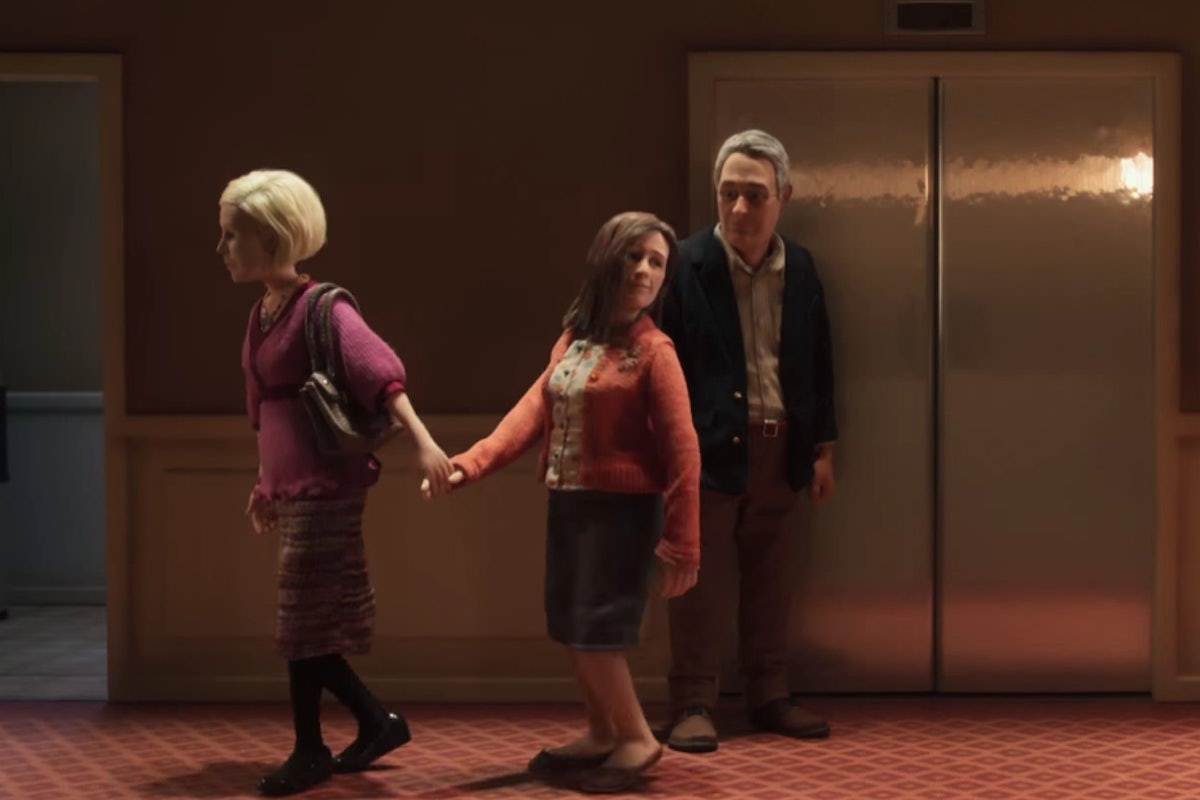Anomalisa (2015).
Michael Stone is a writer, public speaker, and a miserable middle-aged man. He sleeps restlessly, he’s bored of the endless droll of everyday human interaction, and he no longer feels anything for anyone. He is a native of England, so despite living in Los Angeles he speaks in an English accent. Everybody else speaks in a generic one. Charlie Kaufman says so much with so little, as could be said of all of his writing. The film takes place over roughly twenty-four hours and in just ninety minutes of screen-time his script speaks so authentically and achingly about the human condition.
We open on an airplane and we quickly realise that every passenger speaks in the same monotone voice. It’s not just the plane, either. It’s everywhere. Michael speaks to his wife on the phone, and then his son, once he has arrived at his plain, stock-standard hotel room. They too share the same male voice as everybody else. To Michael, everybody is excruciatingly ordinary. Nothing is stimulating, and he feels frightfully alone in the world.
 On the way to the hotel room in a taxi, he makes small talk with the driver. Or rather, the driver talks at him while Michael sighs and tries desperately to veer the conversation towards silence. Often he’s misunderstood and asked to repeat himself. On the other hand, others seem to repeat themselves even without prompting. Conversation is just circular for Michael. He’d prefer to avoid it all together.
On the way to the hotel room in a taxi, he makes small talk with the driver. Or rather, the driver talks at him while Michael sighs and tries desperately to veer the conversation towards silence. Often he’s misunderstood and asked to repeat himself. On the other hand, others seem to repeat themselves even without prompting. Conversation is just circular for Michael. He’d prefer to avoid it all together.
We learn that he has a wife and child back home, though we don’t see them yet. We’re also shown glimpses of a woman who we can gather is not his wife. A younger woman lashing out at him, a memory from a time long gone. This woman is an old flame of his, one who lives in Cincinnati, the very place Michael now finds himself on business. He tries to practice his speech for a conference the following day, but is lured away by more interesting options. We all know the feeling.
Only the alternative option for Michael is the phone book lying on the king-size bed of his room. He calls the other woman, a woman who we soon learn had her heart broken by Michael a decade earlier. They meet for a drink and he can’t explain why he left her all those years ago. We get the impression that what he’s doing now, this disloyalty to his wife and search for something different, is something like what he did to this woman back then. He propositions her very poorly, and she leaves in a hurry.
 Even with such a brisk run-time, nothing terribly thrilling happens in Anomalisa. We live in Michael’s head for but a short period of time. We learn his mannerisms, his ticks, we learn the way he responds to things, we watch him fumble with objects the same way we might – the latter is a testament to the attention to detail with which the film is crafted. The sounds are very raw. We hear the smack of lips and the roll of the tongue between words as people converse. The cigarette burns loudly and we hear clearly as Michael inhales smoke. The visuals can be described in the same way. Michael spies someone jerking off in another building from his window. He walks past a couple fighting, an event that doesn’t even warrant a glance from him.
Even with such a brisk run-time, nothing terribly thrilling happens in Anomalisa. We live in Michael’s head for but a short period of time. We learn his mannerisms, his ticks, we learn the way he responds to things, we watch him fumble with objects the same way we might – the latter is a testament to the attention to detail with which the film is crafted. The sounds are very raw. We hear the smack of lips and the roll of the tongue between words as people converse. The cigarette burns loudly and we hear clearly as Michael inhales smoke. The visuals can be described in the same way. Michael spies someone jerking off in another building from his window. He walks past a couple fighting, an event that doesn’t even warrant a glance from him.
Originating from a stage play and then seeing an adaptation to film via a Kickstarter campaign that attracted 5,770 backers, Anomalisa received additional funding from its production company and became a feature length film. Using stop motion animation, its visual style is closer to reality than most of its live-action counterparts. Its characters are bland and unattractive. Even Lisa, for whom the film is named, is not overtly interesting to look at, and has only a noticeable scar on her face to differentiate herself from everybody else.
 The animators don’t shy away from the painstaking process of still-frame storytelling, manipulating the various puppets with facial expressions, often close-ups, in such detail so as to create something instantly immersive. There is a lengthy sex scene, awkward foreplay included, just past the midway point of the film. I’m not sure I’ve ever seen as realistic a portrayal of such an interaction in a film before.
The animators don’t shy away from the painstaking process of still-frame storytelling, manipulating the various puppets with facial expressions, often close-ups, in such detail so as to create something instantly immersive. There is a lengthy sex scene, awkward foreplay included, just past the midway point of the film. I’m not sure I’ve ever seen as realistic a portrayal of such an interaction in a film before.
Lisa, who feels as though she is an anomaly, invigorates Michael. She has her own voice, the first he has encountered in a long time. He bombards her with compliments, with sweeping verbal gestures, and she accepts his advances mostly without objection because she’s never felt so admired or appreciated. There’s a certain level of discomfort in seeing this relationship unfold. Michael may be relatable to us on at least some level, but he’s certainly not the perfectly wholesome, charming man that many see him as in the film. He’s to some degree worshipped by the patrons of the hotel, and especially by Lisa and her friend Emily, because he has a title and a book to his name, and accomplishments that many admire and aspire to.
 Lisa lacks self confidence and has poor self esteem. She’s emotionally vulnerable, and so Michael can take advantage of that. She sees accomplishment as a more redeeming asset than personality. That’s what the world has taught her. She has a hard time believing that Michael finds her naturally attractive. These two people are very different – in age, in experience, in world views. Michael isn’t fascinated by anyone until he meets Lisa, who literally glows in his eyes (some wonderful lighting dresses the sparing number of sets built for the film).
Lisa lacks self confidence and has poor self esteem. She’s emotionally vulnerable, and so Michael can take advantage of that. She sees accomplishment as a more redeeming asset than personality. That’s what the world has taught her. She has a hard time believing that Michael finds her naturally attractive. These two people are very different – in age, in experience, in world views. Michael isn’t fascinated by anyone until he meets Lisa, who literally glows in his eyes (some wonderful lighting dresses the sparing number of sets built for the film).
Sooner or later, Lisa would become as bland, as robotic, as repetitive as everybody else. But this is not because there’s a problem with everybody else. Lisa is evidence of that. She’s a whole person, with an identity we quickly learn and a life we know just enough about to believe that she is real.
 Instead, it’s a deeper dissatisfaction that Michael has with himself, and how alone he feels in the world. He gets home to his wife and child, his relationships with whom are poor. His wife throws him a surprise party but he’s just frustrated by this. In that frustration he asks Donna, “who are you?” She retorts the question back at him.
Instead, it’s a deeper dissatisfaction that Michael has with himself, and how alone he feels in the world. He gets home to his wife and child, his relationships with whom are poor. His wife throws him a surprise party but he’s just frustrated by this. In that frustration he asks Donna, “who are you?” She retorts the question back at him.
If he doesn’t understand himself, how can he love himself? If he can’t love himself, how can he love anybody else? Anomalisa is about human interaction, and it’s about human attraction, but it’s even more personal than that. Michael breaks down during his conference, completely losing his cool as he vents out his frustrations in between customer service jargon. It’s a wonder he became such a voice in the industry, because he doesn’t understand how to find pleasure in the basic art of conversation, or life at all. He’s dreadfully lonely, and he’s also very much damaged goods.
The film has characters that are so well rounded so as to make up for a plot that’s lacking. It is admittedly very slow, and not much really happens but it’s a deeply introspective tale, made purposefully outside of the studio system and is quite unlike anything else. The passion poured into the film is indisputable, yet that doesn’t correlate to something that everybody may necessarily enjoy. Some may be turned off by the character designs, or by the oddball creative choices, or quite simply by the methodical crawl of the film’s pacing. But persistence is rewarded here, and you might just become fixated with what the film explores, the incredibly unique and creative way it does so and the bleak yet strangely intoxicating malaise that directors Duke Johnson and Charlie Kaufman have created.
Film ’89 Verdict – 8/10

